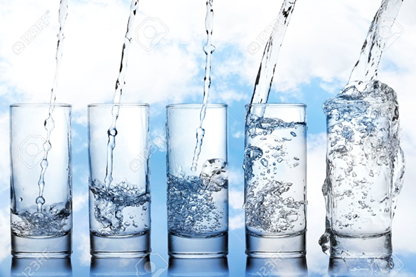
If you’ve ever tried to lose weight, you’ve probably heard a lot about water and weight loss. Can drinking more water really help you lose weight? The short answer is yes — and no. If you’re already well hydrated and getting plenty of water, getting more water into your diet probably won’t make a lot of difference. But if you’re going through your days a little — or a lot dehydrated, as many people are, getting enough water could help. Dr. Christopher Calapai, D.O. is a Manhattan Osteopathic Physician board certified in family medicine, and anti-aging medicine. He states that, “There is always the case of too much of a good thing. Some people are such water drinking devotees that they are aquaholics, resulting in overhydration.” As a result, experts now fear we’ve become so focused on staying hydrated that we’re guzzling water to life-threatening extremes.
Dr. Calapai points out that, “There are two types of overhydration: Increased water intake and retaining water. Increased water intake—or drinking more water than the kidneys can get rid of in the urine—can cause too much water to collect in the body.”
When the body is unable to get rid of excess water, it is said to be retaining water. This happens with several medical conditions, for instance. It can be dangerous because it throws off the balance between water and sodium in the blood.
Overhydration caused by drinking too much water can occur both consciously and unconsciously. Dr. Calapai says that, “A person may drink too much water during exercise. Some medications can also cause dry mouth and cause an increase in thirst. Increased thirst can also be caused by uncontrolled diabetes. Psychiatric conditions such as schizophrenia (primary polydipsia or psychogenic polydipsia) can also cause compulsive water drinking.”
What Are the Symptoms of Overhydration?
Symptoms of overhydration may not be recognized in the early stages but can include:
- Nausea and vomiting
- Headache
- Changes in mental state (confusion or disorientation)
If left untreated, overhydration can lead to dangerously low levels of sodium in the blood (hyponatremia). This can cause more-severe symptoms, such as:
- Muscle weakness, spasms or cramps
- Seizures
- Unconsciousness
- Coma
How Can Overhydration Be Prevented?
Endurance athletes can reduce the risk of overhydration by weighing themselves before and after a race to determine how much water they have lost and need to replenish.
Dr. Calapai emphasizes that, ”Individuals should avoid drinking more than one liter per hour of fluid. Drinking more fluids before and during a race or an intensive athletic exertion can also help you avoid the need to drink too much water afterwards. Sports beverages that contain the electrolytes sodium and potassium are also recommended, as both are lost in sweat.”
So how do you know how much water you need?
For starters, don’t rely solely on thirst, says Calapai. “As soon as you put water on your tongue, you kill your thirst mechanism.” Instead, he suggests the following:
- Weigh yourself daily for a week, to check hydration. “Your body weight shouldn’t fluctuate too much,” Calapai says.
- Notice how much you pee—and its color—in the morning. It should be a copious amount and pale or clear.
- Aim to wake feeling hydrated. If you’re thirsty when you get out of bed in the morning, you may not be consuming enough fluids.
- When choosing sports drinks, search for labels with low sugar. Dr. Calapai recommends about 5 grams per 8-ounce serving. “Even natural drinks like coconut water have too much sugar and potassium to hydrate.”
- Coffee, tea, and watery fruits and vegetables count toward fluid intake. “Also, caffeine is not a diuretic,” Dr. Calapai says. “It’s about volume, so if you drink five cups, you’ll pee more.”
- Start slowly. “Sleep is a six- to eight-hour fast, so if you drink three cups of juice or water right away, you’ll trigger the volume response. Sip instead.”
If you have an underlying medical condition, such as diabetes, congestive heart failure, or kidney problems, talk to your doctor about the best treatments for those conditions. If you experience excessive thirst or an overly strong urge to drink water, contact your doctor before you develop symptoms—it could indicate a medical problem that requires treatment.
Dr. Christopher Calapai D.O.
Anti-Aging Physician and “The Stem Cell Guru”
Dr. Christopher Calapai, D.O. is an Osteopathic Physician board certified in family medicine, and anti-aging medicine. Proclaimed as the “The Stem Cell Guru” by the New York Daily News, Dr. Calapai is a leader in the field of stem cell therapy in the U.S.
Dr. Calapai started his practice in New York City in 1986 and for over 25 years he has hosted nationally syndicated radio shows, including his two weekly call-in shows on WABC 770-AM, where he offers health and medical advice. He has a show on Saturday morning 8-9am and Sunday evening from 6-7pm. He has consulted with numerous high-profile individuals including Mike Tyson, Mickey Rourke, Steven Seagal, and Fox series Gotham’s, Donal Logueand worked as a medical consultant for the New York Rangers hockey team as well as various modeling agencies.
Dr. Calapai received his medical degree from New York College of Osteopathic Medicine and he consults in Manhattan with practices on Long Island, in East Meadow and Plainview. He has appeared on News12 and in the pages of 25A Magazine and Social Life Magazine.
He is the author of E-books Heavy Metals and Chronic Disease, Reverse Diabetes Forever! Seven Steps to Healthy Blood Sugar, Top Ten Supplements You Can’t Live Without, and Glorious Glutathione. Learn more about Dr. Calapai on his website: www.drcal.net

